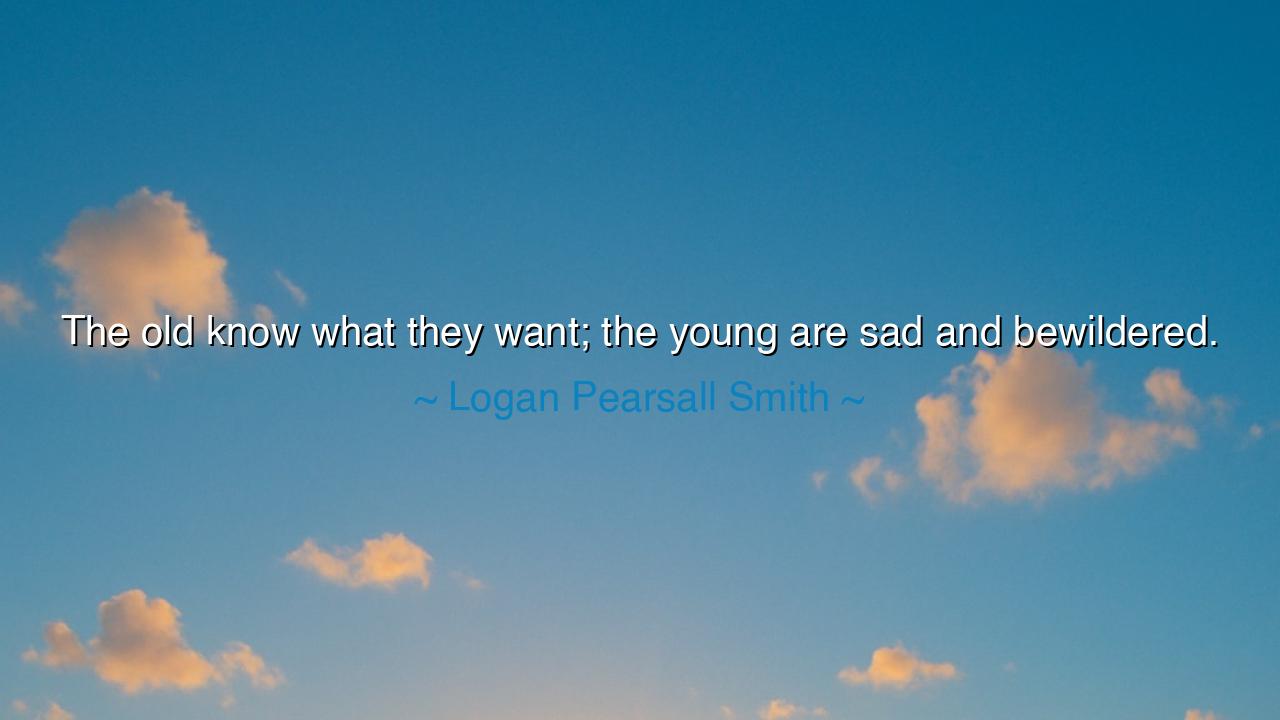
The old know what they want; the young are sad and bewildered.






In the quiet and contemplative words of Logan Pearsall Smith, we find a truth as ancient as time itself: “The old know what they want; the young are sad and bewildered.” Though simple in phrasing, these words strike deep into the human condition. They speak not only of the passage of years, but of the slow evolution of wisdom, the kind that can only be forged through experience, loss, and reflection. Smith, a man of letters who observed the ironies of life with both tenderness and wit, reminds us that the confusion of youth and the clarity of age are not opposites to be judged, but stages on the same sacred journey of understanding.
Logan Pearsall Smith, an essayist and aphorist of the early twentieth century, was known for distilling profound insight into few words. In this quote, he captures a universal cycle—the young, filled with energy but lacking direction, and the old, tempered by years, who have at last learned where to place their strength. His observation is not cruel but compassionate; it recognizes that sadness and bewilderment are the natural burdens of youth. For when one stands at the beginning of the path, every road seems possible, and therefore, none feels certain. The young chase shadows, questioning everything, while the old, having walked through fire and folly, learn at last what truly matters.
The ancients would have nodded knowingly at Smith’s words. In the wisdom of Socrates, we find the same pattern. He spent his life teaching that the first step toward wisdom is knowing one’s own ignorance. The youth of Athens, in their hunger for meaning, were often restless and uncertain, while the elders, though fewer in number, carried a calm shaped by trials. Heraclitus, too, declared that “character is destiny,” meaning that only time and experience reveal one’s true nature. Thus, the bewilderment of youth is not weakness—it is the beginning of the long awakening toward self-knowledge.
There is a story that mirrors this truth: that of Prince Siddhartha, who became the Buddha. In his youth, surrounded by luxury, he was deeply sad and bewildered, troubled by the sight of suffering in the world. Yet it was that very confusion that propelled him into the search for enlightenment. He wandered, fasted, questioned, and endured despair. Only through time and hardship did he find the stillness that revealed truth. The old Siddhartha, now the Buddha, “knew what he wanted”—not because he had avoided pain, but because he had lived through it. His journey shows us that confusion is not the enemy of wisdom, but its forerunner.
Smith’s words also hold a mirror to our modern age, where youth often drown in endless choices, information, and comparisons. The sadness of youth today is not merely emotional but existential—a cry for meaning in a world that moves too fast. Yet the old, having survived their own storms, learn that peace lies not in abundance but in clarity: in the few things worth holding onto—love, purpose, truth, and kindness. The young, in their bewilderment, scatter their energy to the winds; the old, in their knowing, gather it like a flame sheltered from the storm.
From this reflection arises a timeless lesson: do not curse your confusion, for it is the soil in which wisdom grows. The sadness of youth is the ache of becoming. Do not rush to certainty; let time be your teacher. Ask questions, make mistakes, and live fully, for only through experience can understanding take root. And when the years teach you what truly endures, hold that knowledge not as pride, but as compassion for those still wandering as you once did.
So, O listener, take these words to heart: the young and the old are not divided by years, but by perspective. The young look forward and see infinite roads; the old look back and see the one they were meant to walk. Yet both are essential to the great rhythm of life—the yearning that drives us to seek, and the peace that comes from finding. Remember, the sadness of the young is the seed of wisdom, and the clarity of the old is the flower it becomes. Walk your path with patience, for bewilderment will one day turn into understanding, and your confusion into calm. In time, you too shall “know what you want,” and teach another generation how to see.






AAdministratorAdministrator
Welcome, honored guests. Please leave a comment, we will respond soon